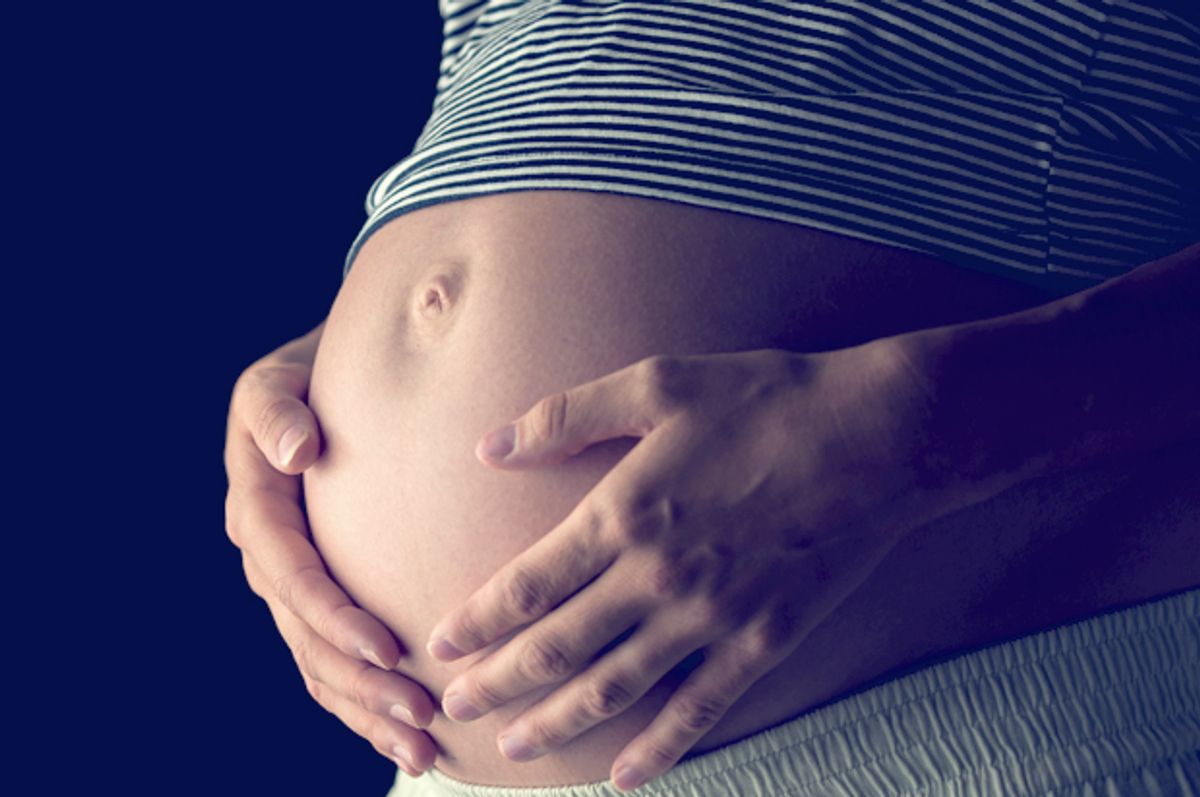I was introduced to the field of reproductive psychiatry three years ago when, at age 37, I told my psychiatrist I was going to try to get pregnant. She reached behind her for her drug guide, paged through it briefly, then tossed it back.
"I don't know enough about this," she said. "I'm going to send you to an expert."
Reproductive psychiatry is, to put it briefly, the treatment of women with psychological conditions before, during, and after pregnancy. They can be conditions you had before, or those that develop somewhere along the way. The treatment can involve anything from light therapy to talk therapy to medication, but the end goal is to have a happy, safe, healthy pregnancy so you can be a happy, healthy mom for your big fat amazing baby.
More from DAME: "We Need to Do Something About the Animals"
I had that happy pregnancy. (Especially the big fat amazing part.) Which is why I was taken back by Andrew Solomon's "The Secret Sadness of Pregnancy With Depression," in which he wrote that for pregnant women with depression, "the questions are ubiquitous, the answers sparse." Well, not in my case. My doctors' faith and expertise were instrumental in my happiness, and the only problem is that more women don't have access to the same care and treatment.
I am Bipolar II. This is not the one Carrie has on Homeland, where you paint your house in blaze-orange over the weekend and then ship it, brick by brick, to Ireland. It is the one with frequent episodes of depression, cut with a mild mania that is often mistaken for charm.
Over the past two decades, I have taken Effexor, Lithium, Buspar, Wellbutrin, Klonopin, Topamax, Lamictal, and Prozac—the last two of which have let me be my fundamentally cheery self for over a decade. After several sessions and a thorough history of my meds and moods, my new reproductive psychiatrist made a judgment call.
"There are some people who can go off their drugs during pregnancy," she said. Pause. "You are not one of them."
In Solomon's article, that's largely depicted as a tragedy. He quotes the director of the women's program in psychiatry at Columbia—which is where my doctor is from—as saying, "Every woman I treat who has depression would love to be off her medication." It can, Solomon adds without specifics, "be dangerous for the baby."
More from DAME: "Debauchery is Fun -- to Visit"
Actually, the field agrees that the worst thing for the baby is a depressed mother. I know my unmedicated self, and I was relieved to learn that I could stay on my meds—not only for me, but for my baby. (Yes, I was afraid he would have gills. I'm not crazy.) But my doctor was well-informed about the research on my two drugs, and I was able to make the choice without fear or shame. (Much.)
All of this may sound like a lot of hoopla for one baby, but all I could think throughout the process is that every pregnant woman get the same treatment. (Many of my preggo friends agreed, especially those steering their way around message boards to see the latest panicked posting about Welbutrin.) Every woman should have a psychiatric consult, if only so they have a name. Every woman should have access to integrative therapy like a specially tailored vitamin regime (awesome), and every woman should, by default, have access to therapeutic check-ins—especially because, as any depressive can tell you, the worst time to find a doctor is in the throes of a depressive episode.
When you're on meds, you only get credit for being crazy, not for being a person sane and responsible enough to take the meds you need. When I went to the hospital to give birth, my chart emblazoned with the my status as a 40-year-old bipolar single mother on two different drugs, the relief in every doctor's eyes when they saw me—hair groomed, verbal, not even that exhausted—was palpable. (I still they think they thought I might be a lady who got mistakenly pregnant because she was bipolar.)
There's a case I can never stop thinking about: that of Miriam Carey, a woman who, in 2013, while suffering post-partum depression, drove into the White House with her baby and was shot to death in her car. Solomon's article begins with another devastating case: a mother who committed suicide mid-pregnancy.
What strikes me is not only how much these women asked for help, but that they were in treatment at the times of their deaths. Carey had been hospitalized, and was on anti-depressants. The other was under the care of a psychiatric nurse practitioner, who was on-call for an "emergency prescription."
More from DAME: "I Can't Believe I Lived to See Legalized Marriage"
Solomon talks about the shame mothers feel in asking for help, but clearly this isn't a question of not asking—it's not getting the right help. (Incidentally, every women he interviewed asked Solomon for help, too.) I could not stop thinking about how Carey, and now this woman, were killed for such a treatable condition. If they had had my doctors, I tell myself, they would have been okay, because my doctors would have made sure they were.
We can't know if that's true. But I do know I had a thrilling, delightful pregnancy, and a confident launch into Momhood (insofar as anyone can), because my doctor sent me to an expert. It's one thing to not know reproductive psychiatry—but it's another to talk to one of the premier clinics in the field, as Solomon does, and suggest women have nowhere to go.
Alongside the article run shadowy, gravid figures. The women have their faces turned away. I wish they could see me—a happy mom, with a big fat happy baby—so they know what they have to look forward to.
- See more at: http://www.damemagazine.com/2015/06/23/i-happily-took-anti-depressants-during-my-pregnancy#sthash.WTlRp3Ij.dpuf




Shares